How do you define your Jewish identity?
See my article in the Jewish Journal.
http://www.jewishjournal.com/opinion/article/what_we_are_and_what_we_are_not
How do you define your Jewish identity?
See my article in the Jewish Journal.
http://www.jewishjournal.com/opinion/article/what_we_are_and_what_we_are_not
In the English language, homonyms are words that sound the same but are spelled differently and have different meanings.
In Hebrew, however, any time the root of a word has dual meanings, they are always interconnected and teach us a generality of wisdom.
For example, let's look at WORD itself: the root DAVAR means both a word and a thing.
The lesson?
Words are powerful. They are not just a method of articulation that you give and receive.
They create things.
We see this in the beginning of time, when G-d literally created things with His words.
He said, "Let there be light," and there was light.
And all of us have experienced this power firsthand, where words have destroyed, and words have built up. Words have hurt, and words have healed. Invigorated. Inspired big things.
What do your words create?
In our fast-forward culture, it is inevitably difficult for many of us to "be there" completely. As you drive your brand new car out of the auto-mall, there is a 2015 newer rival waiting in the shadows. When our child is talking to us, it's hard not to notice the work waiting. When you purchase a new computer, you know it'll be a year at most before a better one will emerge. So instead of living the moment, we're constantly looking ahead, looking to what we will buy, what we will do, what will happen.
 Which makes the concept a worn-out cliche: Live in the moment, stop and smell the flowers, stop waiting for things to be over.
Which makes the concept a worn-out cliche: Live in the moment, stop and smell the flowers, stop waiting for things to be over.
Certainly it is good to have a well-rounded perspective, leaning into the past for insight, savoring the present mostly, and thinking about the future to be prepared.
But what happens when we're too absorbed in our problems, waiting for things to be over, or living in the future? What happens when we spend our precious time with our loved ones worrying about, or thinking of, what will be with this, that and the other thing?
We become like the little baby in utero at a symphony orchestra. Wrapped in concealing layers. There but not all the way there. Perhaps hearing, but not fully experiencing, the music.
Needless to say, the worrying doesn't help the problems. For me, they only start to grow bigger in my mind, bigger than my child's desire to have me dance-but really dance-with her all around the kitchen. And she can sense that detachment.
Other times, the real way to live in the moment, to accomplish something, is to do nothing. To sit on a park bench, with my earpiece off, my laptop out of sight, just being. Simply present. So that as my children climb up the bars, they will have the delight of knowing that Mommy is there, available to be impressed by their ability to get to the top.
To actually do something as “ridiculous” as holding my son for an hour-while he sleeps unaware, during his afternoon nap, just savoring his baby smell and his fleeting babyhood.
So my resolution is to try to retire from my constant absorption and worry. To close my eyes to fully concentrate on the beauty of music, to open my eyes to the wonder of these precious moments with my children when they are still young, to enjoy the magnificent scenery as I drive each day, to live in the here and now. It's not that I'll be naive, pretending that my problems don't exist. It's just that life is too short to dwell on them non-stop, when I could be dancing-really dancing-with my daughter in the kitchen.
At times, the media, and the Israeli government itself, has voiced Israel's "right to defend herself."
But in truth, the correct word in this context is "responsibility."
While the differences may seem subtle, in actuality the underlying attitudes are worlds apart:
The government has the right- implying choice- to defend its country.
The government has the responsibility- implying obligation- to defend its country.
When our loved ones' lives are in danger, is it a choice or obligation to protect them?
On RCS Lesson 7, Shavuot- Engraved in Your Heart; Finding Personal Meaning in the Ten Commandments.
From Webster dictionary:
Rights- a legal entitlement to have or obtain something or to act in a certain way.
Responsibilities- a duty or task that you are required or expected to do; something that you should do because it is morally right.
We are blessed to be surrounded by a culture that emphasizes freedom of the individual and the rights of self expression. Looking at life through this Western lens, we're likely to feel that rights are of paramount importance to fight for. But can this noble perspective work within spirituality; can it sustain Judaism? It's my right to observe Shabbat on a Sunday; Saturdays don't work for me/It's my right to change this mitzvah; it's outdated for my lifestyle/It's my right to be called up to the Torah.
If we view life through a Jewish lens, we learn that it is about responsibilities. Jews since the beginning of time accepted that Judaism is about our obligations to G-d: It's not easy to be loving to this family member, but it's my responsibility to take care of their needs/It's my obligation to give myself and my children a Jewish education.
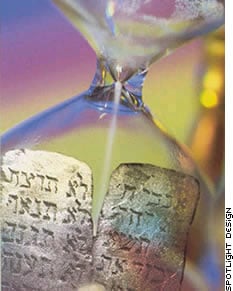
Being spiritual is not (only) about how I want to serve G-d; it's about how G-d wants me to serve G-d.
And it is ultimately through fulfilling our responsibilities that we find the deepest kinds of happiness.
It is important for a democracy to preserve our freedoms and rights.
It is my destiny as a Jew to fulfill my spiritual responsibilities.
Hence, the "Ten Suggestions" as our society has coined them is ultimately, still, the Ten Commandments :)
How do you view the Ten Commandments?
Do you think Judaism can be preserved if it is viewed as a bill of rights, as a suggested way of life?
On Lesson 6, Pesach- Free At Last; Redifining Freedom in the 21st Century.
What is freedom?
Some might say sitting in the park on a sunny day. Having your dream job. Being able to retire. Getting the garage organized.
The existential answers range from feeling joyful to living without depression or fear.
But is freedom only about removing ourselves from chains?
We cannot disentangle ourselves from emotional and psychological bondage simply to be free (a self-serving pursuit).
With our success in removing constraints comes the importance of being free For Something.
I want to feel less fear...but do I know how I will conduct my nights and days when I'm less fearful?
I want to get rid of my doubts and indecision...but do I know what I want to be decisive about?
I want to stop wanting material things to fill a void...but do I know what to fill that void with?
When our freedom is not directed towards a goal, freedom isn't free.
Freedom then comes with a price, not a purpose.
The same purpose of the Jews who left slavery in Egypt after Moshe told Pharoh to "let my people go," as he explained, "so that they may serve G-d."
It's been three thousand years since that conversation, but Egypt remains not only a geographic location, it is also a mindset.
We still want to "let ourselves go" from the bondage of self.
So what do we want to do with our freedom?
Beyond sitting in the sun and dream jobs and living without fear, at our essence, we want to lead our most meaningful life possible, infused with spirituality. Thinking about the world outside ourselves; our Creator's desires, others' needs.
On the deepest level, we simply want to serve G-d.
What does freedom mean to you?
Is there a universal definition?
This blog is inspired by my latest Passover efforts.
As I had to accept that there are certain house projects that I once again will probably not get to in the annual deep-cleaning fest, I began wondering what would replace all the tasks that have grown so large in my thoughts: What if all these projects were done? What if I was able to clean up all the clutter in my mind? What if all my circumstances were perfect? What would life...freedom...look like then?
Deep down I know that whether wonderful improvements are in store, or things will stay exactly the same, the key to freedom was and always will be accepting my reality and asking myself how I can infuse spiritual meaning in the here and now.
On RCS Lesson 5, Purim- Your Reason for Being; Uncovering Your Personal Mission--A Lesson from Queen Esther.
We inhabit a sliver of our little planet and yet at times our ego consumes us, leading us to feel that we are the universe, that we are all that exists.
Our perspective might be a bit wider, as we think about the people and places within our immediate surroundings.
We might marvel further at the vastness of the oceans and lands abroad, especially when sitting on an endless plane flight.
But how often do we contemplate just how vast the universe is?
I often think how big California is, but it's only a fraction of a planet.
I think about our Earth, but it's a grain of sand in a dune of endless galaxies and planets.
I think about how big and bright the sun is, but there are billions upon billions more.
I think about the stars, tiny and twinkling at night, but they're actually thousands of times larger than our planet Earth.
When we are only focused on our sense of self, planets, stars, galaxies, and most importantly people all fall away.
But when we think of the opposite extreme- that we are physically infinitesimally small- it can make us feel insignificant.
While materially we are indeed smaller than a grain of sand, spiritually, we have the power to make a cosmic effect, more than that magnificent moon in complete silvery splendor that doesn't struggle with free choice to shed light.
The beautiful Yom Kippur prayers remind us, "Though Your mighty praise is proclaimed by heavenly angels, by celestial beings who flash like lightning...yet You desire praise from mortal men whose years are few...who are surfeited with anguish, whose souls are grieved...who seek pardon...who hasten to Your gates...and this is Your glory."
What's your raison d'etre?
PS- We took our children last week to the Griffith Observatory, a museum containing an extensive array of space and science-related exhibits.
Boy did I feel awe and did I feel tiny in that large room of wall-to-wall displays of towering "celestial beings."
I found myself wondering if the other museum-goers and docents, from a wide range of backgrounds, speaking a multitude of languages, felt similarly disconcerted about their smallness.
There is clearly an international, universal pull to this Observatory- are the reactions also similar?
I'm so grateful for Judaism's perspective in showing me that I matter: not in an arrogant way, but in an awesome, responsibility-laden way.
On RCS Lesson 4, Rosh Chodesh-The Woman in the Moon; Kabbalistic Insights into Femininity and the Jewish Calendar.
The moon.
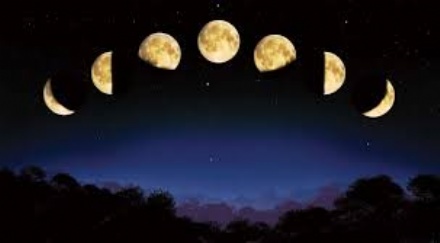
At times barely a sliver; other times in full silvery splendor.
Isn't that the pattern of our lives?
One day we're feeling vibrant, reflecting light wherever we go; the next, life has us feeling small; and yet the next we're feeling pretty much invisible.
Until the time comes again when we're feeling seen, when we're illuminating our surroundings.
Why does Kabbalah compare specifically women to the moon?
Should a woman have a distinct role in spirituality? At home? In the workplace?
On RCS Lesson 2, Asarah B'Tevet-Finding Faith; A Jewish Perspective on Pain and Suffering.
It was shortly after my son's bris when we realized he was extremely pale and rushed him to the emergency room.
For the next five hours, doctors, nurses, phlebotomists...poked him from head to toe, trying to find a vein so that he could receive a desperately-needed blood transfusion.
Understanding that he would have to undergo a cutdown if we failed to find a vein, I firmly restrained his tiny arms while my husband restrained his legs so that the medical professionals would have better access.
So there I was, a mother, unbearably yet willingly pinning my baby down so he could be poked.
But who did he turn to for comfort when we took a break from the torture so he could catch his breath?
 The same mother who pinned him down.
The same mother who pinned him down.
Perhaps we, too, are that little flailing infant.
Powerless. Prodded, poked, some getting the wind knocked out of them...by our Parent.
And we tremble and cry, are angry and hurting, and we can't begin to fathom the meaning in all of this.
And yet, we keep coming back to G-d, the Creator of our destinies, to connect with Him- because the cliche is true: He comforts like no one else can.
Even when pain and suffering remain a mystery, even when we're angry, we want the comfort of His arms around us.
And so we keep coming back to You.
Some of the greatest leaders in Jewish history stood up to G-d; demanded to know why this world is so filled with suffering.
Is it OK for us to question, demand of G-d?
Can one have a dichotomy of pain and anger and faith?
PS- Thankfully, a nurse managed to find a vein, minutes away from a cutdown, and our son got the life-saving transfusion.
He is now a healthy, energetic ball of six-year-old energy!
We made a feast of thanksgiving, expressing gratitude to G-d and to all the doctors and nurses who made his recovery possible.
When life is good, we have to keep coming back to Him then, too.
In RCS Lesson 1, Chanukah-The Enlightened Maccabee; The Message of Chanukah in a Modern World...
We discussed the core divide between the Jews and the Greeks.
While they were actually quite similar in their emphasis on education and morality, their points of departure couldn't be more different.
For the Greeks, their intellect defined their values; for the Jews, G-d, expressed through His Torah, defined their values.
As such, the Greeks were steeped in secular culture; the Jews steeped in Divine ideals.
In this video, Rabbi Sacks makes a powerful case for religion.
While the video insinuates that contemporary society has abandoned spirituality altogether, I think it would be accurate to say that our society seems to primarily emphasize other sources as solutions, as opposed to using other sources for the good, while focusing on spirituality to give us meaning and purpose in answering "three questions that every reflective person must ask: Who am I? Why am I here? How then shall I live?"
I exited the library last week with a tall pile of books, many of them classics I had read as a child.
As my own children become seasoned readers I want to encourage them to read the writings that had touched me; that I read over and over again.
This led to me myself revisiting these beloved worlds.
And I marveled at all of the new dimensions that jumped out at me; perhaps because it's been so long...I think it might be more because we ourselves change over the years.
Chanting the repetitive words of Good Night Moon with my three-year-old, I saw the appeal of the repetition- pleasurable, predictable, comforting.
Looking at the familiar pictures in The King's Stilts as an adult, I noticed the skill in the nuanced drawings.
Reading about Fantine's plight in Les Miserables as a mother made me understand more the pain in the depths of her soul.
The nostalgia...and the newness of these old books got me thinking about all the different aspects of our childhoods- places, people, friends, foods, music, scents, anecdotes...spirituality...that we might experience years later in a whole different way.
For a lot of Jews, being Jewish growing up meant enjoying the rich cultural aspects of the holiday seasons- sizzling latkes and menorahs on Chanukah, family Seders with matzah and horseradish on Passover, apples dipped in honey on Rosh Hashanah.
While actions are ultimately what sustain the value of these spiritual times, many of us were not exposed to the deeper messages and ideas behind the practices, behind the very holidays themselves.
Messages and ideas that are directly relevant to the way we think and feel and act...to day-to-day life.
Without the inner meanings as an adult, we might perceive much of Judaism as "kids' stuff" or solely as a way to stay connected to our families and our past.
I invite you to revisit the holidays with me- with the wisdom of our experiences and years behind us- and take a deeper look at the universal appeal of these special times of year.
In our upcoming Rosh Chodesh Society Course, A Reason to Celebrate; Illuminating Our Lives Through the Jewish Holidays, we will be examining their relevance to today's world, and specifically to women.
Register here for membership, or for individual classes.
This wonderful weekend culminated in a beautiful banquet at the Manhattan Hilton.
"Out of many, one."
Sitting in a room with 2000 of my colleagues, I realized what a deep, innate need we human beings have to feel a sense of belonging in this vast universe.
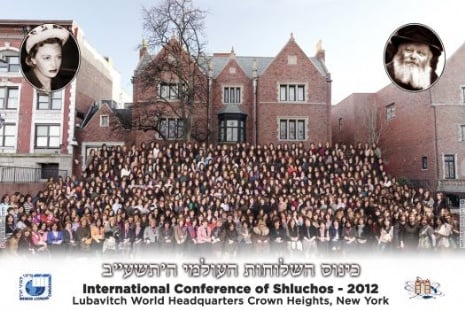 The yearning to be part of something larger- something that goes beyond ourselves.
The yearning to be part of something larger- something that goes beyond ourselves.
Not just to a species, not only to a religion, but to a personalized group within a religion.
Identifying as a Jew is powerful. Identifying as a Chabadnik enriches my identity as a Jew, and gives an added layer of comfort and belonging- and as Jews, we are all part of it! (or as part of it as we want to be!).
Surrounded by my Jewish sisters, it was clear that it is our deeply-rooted spiritual identity, our global community, that allows us to flourish in all corners of the earth and embrace all of mankind- those who are similar, and those who are different, those who come close, and those who are at a distance.
What is true Jewish unity, and world unity?
It is not simply our common humanity, but our common capabilities to make this world into a spiritual garden.
A place of beauty and peace in the ways that G-d expects.
Four languages, ten women, one table
At my dinner table alone, there were quite a few rebbetzins who spoke French, Italian, Russian, and Hebrew; some of them knew English as well, a little bit, or not at all.
They had Chabad Houses in France, Italy, Russia, Israel, and various places in the U.S.
All of us have hugely different lifestyles, immersed in vastly different cultures and challenges and languages. 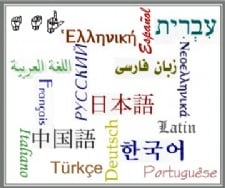
We are all hugely different, and yet we are all exactly the same: ultimately, we are all souls, involved in the sacred task of igniting the torch of Judaism to warm as many other souls as possible.
The powerful connection we felt to one another that intense evening as we laughed and cried and celebrated together transcended our differences.
Rights vs. Responsibilities
Looking around the room teeming with women, I thought about all of the hundreds of women's conferences/feminist conventions that take place each year.
The Lubavitcher Rebbe empowered women to use their abilities to transform the world.
Perhaps one could say that at this annual conference, we celebrate the spiritual side of feminism.
While contemporary feminist conferences celebrate (achieving) rights, this Chabad conference celebrates responsibilities. It celebrates our obligations to nurture, to give, our power to touch hundreds of lives, making this world a more spiritual place.
At the end of this intensely beautiful night, the point of departure was not what the world needs to give us, but rather, what we need-and can-give to the world. In the words of the Twelve Step Programs, "...life run on self-will can hardly be a success."
Roll Call: Truth Endures
The Hebrew word for truth is emet, which begins with the first letter of the alphabet (aleph) and ends with the last (taf). Truth is something that remains true from beginning to end, for all of eternity, despite challenges and difficulties: The Chabad Houses across the globe.
As a woman announced each country, asking those who live there to rise, at times, only a handful stood up, and even a single rebbetzin, like the ones in Cyprus, Singapore, and Vietnam.
These posts often necessitate the rebbetzins to wait for kosher food shipments, learn a brand new language, learn a brand new culture, and go months without seeing friends and family for the sake of our spiritual family, the Jewish people.
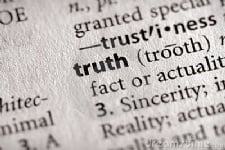
In a society that is infatuated with fame, these women embody what Judaism cherishes: the often unseen acts in life of the individual that ultimately shape our world.
The further from civilization the women lived, the more beautiful they seemed! There is radiance...an inner beauty that shines on their faces, reflecting grace, commitment, and strength.
The second roll call requested that "all those who went out on shlichut in the 60's, please rise...all those who went out in the 70's, please rise...in the 80's..." and so on and so forth.
While there were a substantial amount of women standing, when the request came for "all those in the 2000's, please rise," the overwhelming majority of the women present stood up: Most rabbis and rebbetzins at their posts today went out after the Rebbe's passing. The truth of the Rebbe's vision of a rejuvenated Jewry prevails, time and time again.
I was privileged to see it clearly that night, in the huge empire the Rebbe has built, from Alaska to New Zealand.
There is a story that has been passed from generation to generation. It has many variations, but its eternal message is unchanged: In a small European village a few hundred years ago, there lived a beloved Rabbi who would mysteriously disappear each Friday afternoon.
His devoted and admiring chassidim would speculate that he went to heaven, connecting to G-d and His angels in the heavenly spheres in preparation for the holy Shabbat.
One day, a stranger was visiting the town. He scoffed to hear the townsfolk’s presumptions about the Rebbe’s whereabouts.
More than a little skeptical, he secretly followed him the following Friday afternoon.
Speechless, he watched this esteemed Rebbe, dressed as a peasant, climb deep into the woods with a sack on his back, and chop down wood.
He then proceeded to bring the firewood and the sack into the lonely little house of an impoverished widow and five small children.
No task was beneath this great Torah scholar as he created a blazing fire in the fireplace, unpacked the food and clothes from the sack, lovingly fed the children and left the woman with many kind and caring words.
Arriving back into the village, the chassidim eagerly asked the stranger to describe the Rebbe’s ascent to heaven.
“Nu, do you believe us now that our Rebbe goes to heaven?!” they asked him.
The humbled man replied, “Perhaps even higher.”
What is true goodness? What is true giving?
Judaism gently teaches us through the stories of the scroll that true goodness is not carried out in a blaze of glory.
True goodness and giving often involves nurturing and caring in little ways that go unseen.
Often when it’s hard.
Often when it hurts.
Often when it’s not really “my job.”
Impacting this world is not reserved for the knight in shining armor, for the air-brushed faces of Hollywood.
It is the responsibility and right of every one of us- with all of our talents and strengths, and yes, with all of our weaknesses.
We, and our loved ones, are immortalized long after we are gone through the kind acts on this earth- the comforting whisper to a frightened child, the mending of a broken heart, the giving of tzedakah when we need to dig deep, the patience and forbearance to a cantankerous relative, the nourishing home-cooked meal delivered with love…
It is through the goodness and giving here below that we touch the divine, ascending higher than heaven.
I climbed into my little son's bed and kissed his long delicate lashes. His face was flushed from a hot bath, and his eyes had been struggling to stay open as he waited for me to come say goodnight.
Now they fluttered and then closed as he felt my arm around him.
Just when I thought he was deeply asleep, he startled me, whispering, "Don't leave me."
I smiled and hugged him tight.
And then I thought, dear G-d, please make sure I don't leave him.
Allow me to be here for him physically, emotionally and spiritually.
And dear G-d, please don't leave me.
Allow me to feel Your presence, Your love.
When life is hurting.
When life is happy.
When I am awake and aware.
And when I am asleep.
Chanukah is coming! Time to kindle the menorah, eat some chocolate gelt with the kids, perhaps play a game or two of dreidel.
But really, what does this ancient story in the second century BCE have to do with my life in 2010?
In a time of darkness, the Macabees found a flask of oil that illuminated the menorah for eight miraculous days.
We remember this miracle by lighting a menorah for eight days, too.
According to Jewish law, a Kosher menorah needs to contain eight candle-holders. Eight potentials for light. If one is lighting on Day Three, it is irrelevant that he does not need the remaining five holders. They have to be there.
The deeper reason: The ultimate way to maximize growth and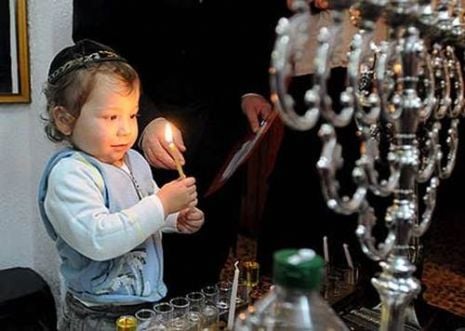 potential is to fully act on one moment at a time, while looking ahead to future growth and potential. Future light.
potential is to fully act on one moment at a time, while looking ahead to future growth and potential. Future light.
What is light?
Scientifically, we know that light moves in electromagnetic waves. Currents. Endlessly moving.
The light, the goodness that we create, too, must keep creating vibrations, movements, ripple effects.
Light giving impetus for more light.
As we celebrate each accomplishment, we can look to the future and know that there is more.
Light is lighting Shabbat candles on Friday afternoon before the sun sets, and then adding a dinner to go with it.
Light is being patient with a new clerk on a busy morning, and then bringing that patient attitude to the rest of my day.
Light is picking two Kosher items to put in the shopping cart, and then being open to exploring more.
Light is calling someone who is lonely just to say hello, and then calling a little more often.
Light is setting aside five minutes a day to learn Torah from the wealth of information on the web, and then perhaps joining a class when possible.
Light is giving Tzedakah to important organizations, and then giving daily- even if it's a coin or two in a Tzedakah box.
Light is all of the goodness waiting to be done.
On the Lubavitcher Rebbe's 70th birthday, he was asked by a college student if it was possible to be his Chassid without donning the Chassidic garb, without growing a beard.
The Rebbe replied, "Every day, even now, I wake up each morning seeking to make it better than the day before. If you only make the commitment to do this, to consistently add in goodness, I will be proud to call you my Chassid."
Judaism at its essence is a living ideology.
At Passover, we don't simply celebrate a liberation from slavery 2,000 years ago- we focus on breaking free from our own inner-Egypts.
At Shavuot, we don't simply read about the giving of the Torah to a brand-new nation- we renew our commitment to receiving the Torah into our own personal lives.
At Chanukah, we don't simply tell the age-old story of a flask of oil that burned, and burned, and yet burned some more- we add one candle each night, a reflection of the goodness we strive to accomplish, banishing the darkness in our world- not through sweeping it out with a broom- but by adding, and adding, and yet adding light.